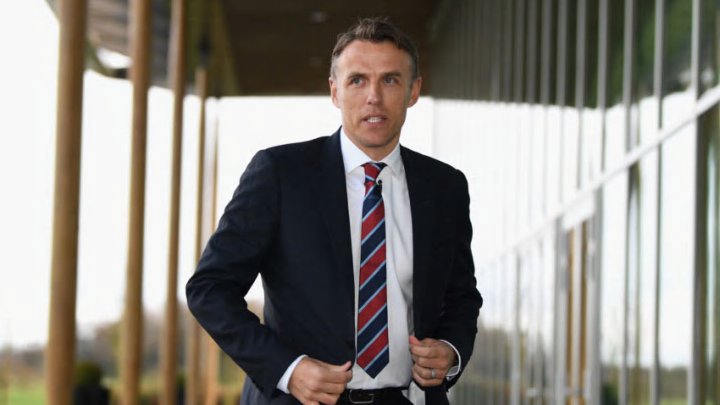What does the appointment of Phil Neville as England women’s team manager say about the state of the women’s game and the FA?
Another day and another FA recruitment process is under scrutiny, as Phil Neville is confirmed as the new England Women’s team manager.
This was a strange appointment as apparently Neville had not even formally applied for the role! Many of us who live in the world outside the sometimes rarefied environment of professional football would find this a little unusual for sure.
But leaving that aside, as surely as day follows night, once the decision was announced the problems started. It soon became clear that Neville had been posting on Twitter in the past and those tweets came back to haunt him.
Some of the posts might have been taken out of context or meant in jest. However, whenever you talk about battering women it does surely raise serious questions about your attitude towards them.
More from Playing for 90
- Alexia Putellas reaches 400 games with Barcelona
- Everything you need to know ahead of the 250th ‘Super Clásico’
- Barcelona put five past Real Betis
- Manchester City suffer but come away with win over West Ham
- Baffling Liga MX ruling strips Puebla of a hard-earned victory
Once again social media has come back to bite someone. You sometimes wonder whether Facebook and Twitter might not be more trouble than they’re worth.
Social media has great potential to enable us to communicate quickly and easily with each other across continents in just seconds. But of course unlike a conversation in the pub, once it’s written down and posted online it’s always there ready to resurface.
Apart from these issues about Neville’s attitude to women, there are also the questions of the FA’s competence (once again) and why he was considered the best candidate for the role?
It seems the FA is an organisation almost chronically incapable of getting these decisions right. This is particularly important in the case of the England women’s team, given what has gone before.
There was the controversy over the alleged lack of due diligence shown by the FA when they appointed Neville’s predecessor, Mark Sampson with past allegations of inappropriate behaviour seemingly ignored.
Then just recently there was more controversy over alleged discriminatory language and attitudes towards one of the England players, Eni Aluko during Sampson’s time as manager.
Given all this you might think the FA would be even more determined to follow an absolutely rigorous approach to finding his successor. That doesn’t seem to be the case again though, as something as basic as checking a candidates Twitter history appears to have slipped past them.
Granted a few tweets from past years shouldn’t necessarily dictate whether you get a job but in these media orientated days and with the FA’s recent history, it must play a part in the consideration of whether a person is suitable. This is even more relevant in such a high-profile position as a national football team manager.
It also seems a little odd that someone like Neville with so little top-level coaching and managerial experience should get this job. If you are taking on the role of managing an international team, then you need a minimum of several years’ experience managing sides in competitive league football.
The Lionesses have enjoyed several seasons of real success, claiming third place at the World Cup and reaching the semi-finals of the Euros. They’ve achieved a lot more in this period than the men’s England team has managed for a very long time!
Neville has only actually managed a team once, Salford City, the club he co-owns with other members of Manchester United’s so-called ‘class of ‘92.’ With all due respect to Salford City, that doesn’t amount to much top-level managerial experience!
It is a sad indictment of the lack of qualified female coaches in the game that the FA turns to a former player with such limited real coaching experience and none in the women’s game. It’s true that several women coaches working in the WSL were considered, but there seems to be a serious lack of candidates out there.
Next: Is Sanchez right for Man Utd?
The womens’ game in England is now professional and the top players are becoming well-known stars who are inspiring a new generation of girls to take up the game. Women’s football is growing fast and I think those playing it deserve a bit more respect than they sometimes appear to get from the footballing authorities.
